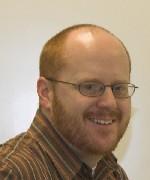Posted on Friday, September 21, 2012
NEW WILMINGTON, Pa. - Westminster College science students will have access to a variable pressure scanning electron microscope (SEM) that will be housed at Youngstown State University (YSU) as a result of a National Science Foundation (NSF) grant.
The grant was awarded to YSU "for the acquisition of the SEM equipped with high resolution imaging detectors, an energy dispersive X-ray spectrometer, nanometer pattern generation system, electron backscatter diffraction, and remote control capabilities," according to the NSF website. "This instrument will enhance existing novel materials research programs, promote science, technology, engineering and mathematics education at regional northeast Ohio and northwest Pennsylvania institutions, facilitate and enhance multidisciplinary research and expand academic-industrial collaborations."
Dr. Peter Smith, Westminster associate professor of chemistry and co-principal investigator on the NSF grant, said the SEM will allow researchers to view materials up to 500,000x magnification. "They will be able to see structural details in a material that are smaller than one micrometer - about 20 times smaller than the width of a human hair."
While the equipment will be located at YSU and opportunities to use it will be available to several institutions, Westminster students will be trained to use the equipment and will be preferred users.
"Westminster students will have two routes of access to this instrument. My research students will routinely use the SEM to image materials that we are currently making," Smith said. "We are making new materials that have potential commercial applications. Specifically, we are making new rare earth silicates that have potential to be used as light-emitting materials in various applications from medical imaging instruments to fluorescent light bulbs. In order for us to incorporate any of our compounds into commercial devices, we have to thoroughly understand the structural characteristics of the materials. The SEM will allow us to do that analysis."
Students will also have a broader exposure to the SEM through Smith's Inorganic Chemistry course. Inorganic Chemistry is an introductory course focused on the energetics and reactivities of simple inorganic substances. Discussions throughout the course emphasize the periodic nature of the chemical and physical properties of the chemical elements and their compounds. The laboratory component of the course allows students to apply and master the concepts of inorganic chemistry through experimentation. Students create inorganic compounds, analyze those compounds and report their findings.
One of the lab experiments Smith is developing will allow for the students to make a related series of materials with commercial interest. Because the SEM will be equipped with remote access, Smith and the students can send their samples to YSU to be loaded into the SEM by technicians at YSU, and then the students can control the analyses from Westminster. The students can watch the analyses in real time and acquire their images without having to travel to YSU.
According to the website NSF's goals are: "discovery, learning, research infrastructure and stewardship - provide an integrated strategy to advance the frontiers of knowledge, cultivate a world-class, broadly inclusive science and engineering workforce and expand the scientific literacy of all citizens, build the nation's research capability through investments in advanced instrumentation and facilities, and support excellence in science and engineering research and education."
Contact Smith at (724) 946-7299 or email for additional information.
